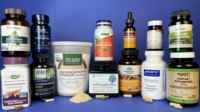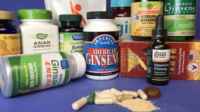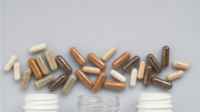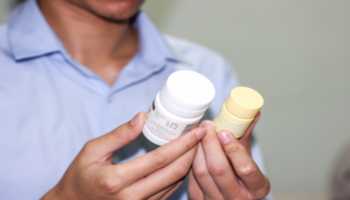
Answer:
Supplements promoted to increase energy, reduce stress and other symptoms caused by "adrenal fatigue" may contain a variety of ingredients, including vitamins and minerals, herbs, and/or dehydrated adrenal gland tissue from animals (typically from bovine source, i.e., cows). While some of these ingredients have individually been shown to reduce fatigue or symptoms of stress, there is currently little evidence that "adrenal support formulas" do the same or improve adrenal gland function. Additionally, an analysis of popular adrenal support supplements on the market found that all contained small amounts of thyroid and steroid hormones, which could potentially cause adverse effects or interfere with blood test results.
What Is "Adrenal Fatigue"
The adrenal glands secrete the "fight or flight" hormones adrenaline, cortisol (to increase blood sugar), and aldosterone (to increase blood pressure). "Adrenal fatigue" is the purported concept that in people who experience chronic emotional or physical stress, the adrenal glands can become overburdened and stop working efficiently — leading to symptoms such as difficulty waking in the morning, tiredness during the day, and salt and sugar cravings.
However, while stress and fatigue can have very real effects on physical and emotional health, there is not enough evidence to prove that these effects are caused by improperly functioning adrenal glands (Cadegiani, BMC Endocr Disord 2016).
[Note: Adrenal fatigue should not be confused with adrenal insufficiency (Addison's disease), a rare but potentially life threatening endocrine disorder].
Supplements for "Adrenal Fatigue"
There is preliminary evidence that some ingredients commonly found in herbal adrenal support supplements may help to reduce symptoms of “adrenal fatigue,” such as stress, anxiety, or fatigue, but there does not appear to be evidence that these supplements affects adrenal gland function or that taking the ingredients in combination formulations is beneficial.
Ashwagandha
Clinical studies suggest that ashwagandha can reduce anxiety, stress and fatigue among people with mild to moderate anxiety, although some studies have shown only modest benefits (Mishra, Heliyon 2024; Lopresti, Medicine 2019; Cooley, PLOS One 2009; Andrade, Indian J Psychiatry 2000). Be aware that ashwagandha might interact with selective serotonin reuptake inhibitors (SSRIs), which are sometimes prescribed for anxiety.
Some research has shown that ashwagandha can slightly reduce stress (Salve, Cureus 2019; Pingali, Pharmacognosy Res 2014), but other studies have not found a benefit (Smith, J Psychopharmacol 2023; Remenapp, J Ayurveda Integr Med 2021). It is possible that only extracts standardized to at least 5% withanolides might be beneficial.
Holy basil
Holy basil extract was shown to reduce overall stress among people with self-reported stress symptoms such as headache, fatigue, forgetfulness, and sleep disturbances in one study (Saxena, Evid Based Complement Alternat Med 2012).
A preliminary study suggested that might reduce anxiety among people with generalized anxiety disorder (Bhattacharyya, Nepal Med Coll J 2008). However, the study did not include a placebo group, which is needed to prove a benefit, and a subsequent study found no benefit of holy basil for anxiety or levels of salivary cortisol (a "stress" hormone) among healthy adults (Sampath, Indian J Physiol Pharmacol 2015).
Licorice
Anecdotal evidence has suggested that licorice might be beneficial for conditions such as adrenal insufficiency or chronic fatigue syndrome, but no clinical studies have confirmed this and consuming too much licorice can cause serious side effects.
Licorice was used traditionally to treat adrenal insufficiency (Addison's disease), a condition in which the adrenal glands don't produce enough cortisol, as licorice contains glycyrrhizin that can block the conversion of cortisol to cortisone and increase cortisol levels. However, not all people with adrenal insufficiency respond to licorice, and those who respond initially may show reduced benefit if adrenal function declines (Methlie, Eur J Endocrinol 2011; Cotterill, Lancet 1973). An anecdotal report suggested that licorice may reduce symptoms of fatigue among people with chronic fatigue syndrome by increasing sodium retention and consequently increasing blood pressure (Baschetti, N Z Med J 1995), but no clinical studies appear to have been conducted to confirm these results. Despite evidence from laboratory studies suggesting potential benefit of licorice for stress, anxiety or depression, there do not appear to be any clinical studies evaluating licorice for these conditions (Wang, Heliyon 2023).
Be aware that glycyrrhizin in licorice can cause loss of potassium, fluid retention, increased blood pressure, abnormal heart rhythms, and lethargy. For this reason, experts recommend limiting intake of glycyrrhizin to 100 mg/day — or about 3 cups of licorice tea per day (European Scientific Committee of Food, 2003). Consuming black licorice candy or taking licorice supplements can also cause these side effects. See our article about licorice for details.
Pregnenolone
Pregnenolone is a hormone that is used in the body to make other hormones, such as testosterone and estrogen, and it is legally permitted as a dietary supplement ingredient. Despite being promoted for reducing stress, there do not appear to be any clinical studies supporting these claims.
Be aware that, in the study described below, only trace amounts of pregnenolone were found in "adrenal support" formulas — less than 0.0012 mg per daily recommended serving, compared to a typical 30 mg daily dose available from pregnenolone supplements.
Rhodiola
Rhodiola may improve mood in people with mild to moderate depression (Mao, Phytomedicine 2015; Darbinyan, Nord J Psychiatry 2007).
Very preliminary studies suggest that rhodiola may be beneficial for anxiety (Cropley Phytother Res 2015; Bystritsky J Altern Complement Med 2008), but higher quality studies are needed to confirm.
Clinical research does not appear to support the use of rhodiola for reducing physical or mental fatigue (Punja, PLoS One 2014; Ishaque, BMC Complement Altern Med 2012; Darbinyan, Phytomedicine 2000; Spasov, Phytomedicine 2000).
"Adrenal support" formulas
Adrenal support supplements can also contain freeze-dried adrenal glands or adrenal gland cortex (the outer layer of the adrenal gland) extract from cows. Once used to treat Addison's disease, adrenal gland extract was found to be low in potency and removed from the drug market in 1978 as synthetic medications became available (U.S. Government Accountability Office 1981). There were also safety concerns with injectable and imported adrenal gland extracts (Galil, Emerg Infect Dis 1999). Adrenal gland extract is available as a dietary supplement ingredient; however, supplement labels do not list their potency or how much of each adrenal hormone they contain.
Concerningly, an analysis of the twelve most popular adrenal support supplements (six herbal, three bovine-derived, and three herbal-bovine combination formulas) sold on a well-known online shopping website found that all of the products contained small amounts of thyroid and steroid hormones (pregnenolone, budesonide, androstenedione, progesterone, cortisol and/or cortisone) that were not listed as ingredients on their labels. Small amounts (0.00000725 mg or less) of androstenedione, a hormone that is not legally permitted in dietary supplements, was found in two bovine-derived supplements. Six of the herbal formulas contained the thyroid hormone triiodothyronine (T3), as did all three of the bovine-derived products and all three herbal-bovine combination products. Amounts of T3 found in the products ranged from approximately 0.06 mcg to 1.3 mcg, which is relatively small compared to a typical prescription dose of 25 mcg to 75 mcg. However, the researchers warned that exposure to these hormones "without health care provider oversight may be associated with serious adverse consequences," and that "consumption of these supplements may also alter clinical laboratory results, thereby leading to an additional unnecessary testing or even an incorrect diagnosis" (Akturk, Mayo Clin Proc 2018).
The Bottom Line:
There is little evidence that symptoms attributed to "adrenal fatigue," such as feeling stressed, tired, or having salt or sugar cravings, are caused by improperly functioning adrenal glands, or that combination formulas promoted for adrenal support improve these symptoms.
Certain herbs, like ashwagandha and rhodiola, found in "adrenal support" supplements may help reduce stress and fatigue, or improve mood. However, you are likely better off trying these as single-ingredient products rather than within "formulas" to be sure you are getting the proper quality and dose. Be aware that supplements promoted for adrenal support and adrenal fatigue may contain undeclared thyroid and steroid hormones that could cause adverse effects or interfere with blood test results.
Join today to unlock all member benefits including full access to all CL Answers and over 1,400 reviews.
Join NowAlready a member? Sign In Here.
Join now at www.consumerlab.com/join/











Submit your comment
This feature is restricted to active members.
Join now to add comments and get all member benefits, including over 1,400 reviews.
Join NowAlready a member? Sign in here.